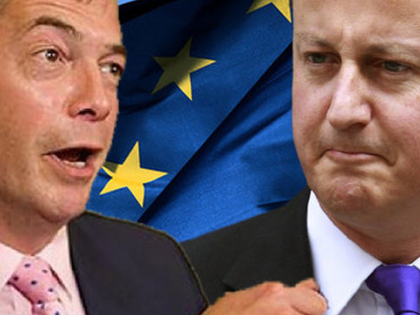Conservative Members of Parliament are apparently demanding that Prime Minister David Cameron begin to consider an electoral pact with Nigel Farage’s UK Independence Party, with some even contending that he should become Deputy Prime Minister next year.
Jacob Rees-Mogg MP has mounted a call for Nigel Farage MEP to be made Deputy Prime Minister, replacing the current incumbent Nick Clegg.
Writing in today’s Mail on Sunday, Mr Rees-Mogg, a staunch Eurosceptic, contends that the Conservative led coalition government has been successful in many ways, but that that success has not translated into Conservative support. He repeats the charge that UKIP siphon right wing votes away from the Conservative party – “About two-thirds of Ukip supporters are former Conservatives.” – and that this loss of support will allow Ed Miliband’s Labour party to retake power in the 2015 general election.
“The obvious answer is for the Tories and Ukip to do a pre-Election deal,” he writes.
“In a first-past-the-post system there is no prospect of doing a post-Election pact; each party takes too many of its voters from the same pool so there would not be enough combined MPs to form a coalition.
“Now there are obstacles in the way of a pre-Election pact, but these are more emotional than rational.”
The Rees-Mogg plan is to create a number of new UKIP Lords pre-election, and to stand down Conservatives in potentially winnable seats: both those currently held by Conservative MPs with a small majority and those held by Labour which UKIP are expected to be able to mount a strong challenge. Provided that the general election was thus won, Farage would be made Deputy Prime Minister, and four UKIP MPs would be given cabinet positions, replacing the four current Liberal Democrat ministers: “replacing Vince Cable with someone from UKIP would have a pleasant irony.”
His ideas are likely to fall on deaf ears, however. The Prime Minister David Cameron has in the past ruled out the possibility of a pact, saying “We are the Conservative Party. We don’t do pacts and deals. We are fighting all out for an all-out win at the next election.” He is also rumoured to have called Farage a “spiv.”
Meanwhile, Farage himself has made it clear that no pact will happen whilst Cameron leads the Conservative Party. Last year a key ally of Farage said he would rather do a deal with the devil: “he won’t work with the Tories if Cameron is leader. He wants his head on a plate.”
The animosity between the leaders is tackled by Rees-Mogg in his piece. He writes “It is said that the two leaders do not like one another, but Coalition has shown that Ministers from separate parties can work effectively with each other, and there is no obvious personal animosity between David Cameron and Nick Clegg or George Osborne and Danny Alexander.”
His reasoning ignores the fact that UKIP make much of not being like the other parties. The similarities – and indeed the good relationship between those four Conservative and Liberal Democrat men forms part of the UKIP narrative that an elite cabal leads the country with UKIP as the outsiders.
Commenting to the media on this May’s local election results in which UKIP took seats from Conservatives, Labour and the Liberal Democrats, Farage said “the Ukip fox is in the Westminster henhouse,” adding “this idea that the Ukip vote just hurts the Tories, I think it’s going to be blown away by these results.”
And on the idea of a pact, he added “The Tories have always viewed me and Ukip as being members of the lower order, so I would have thought that’s extremely unlikely from that perspective. But also electorally, I bet you that if we polled Ukip voters and said to them ‘Do you want a pact with the Conservative Party?’ you would find a very small percentage that would say yes”
The lack of grassroots support is echoed by Conservative Party members. The website ConservativeHome ran a series of polls during the early part of this year across the European election period which found poor and waning support for a pact amongst party members. Those saying that they against a pact rose from 62 percent in April, to 63.6 percent in May, to 64.3 percent in June. By contrast, just 30 percent were in favour.

COMMENTS
Please let us know if you're having issues with commenting.